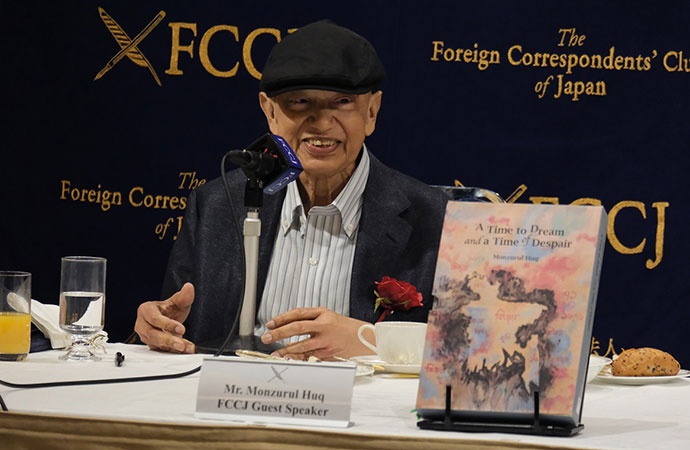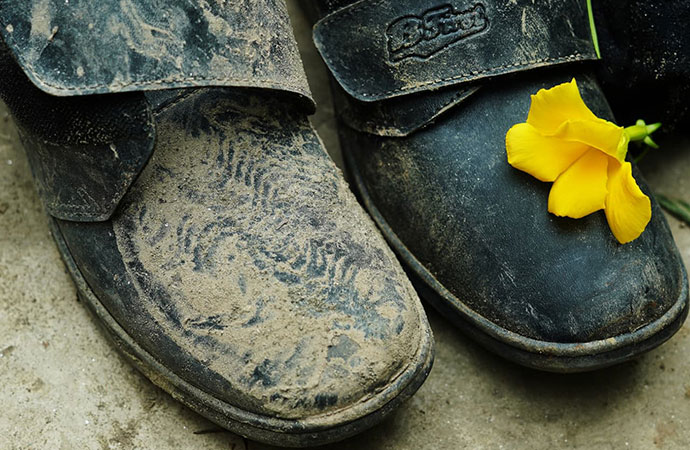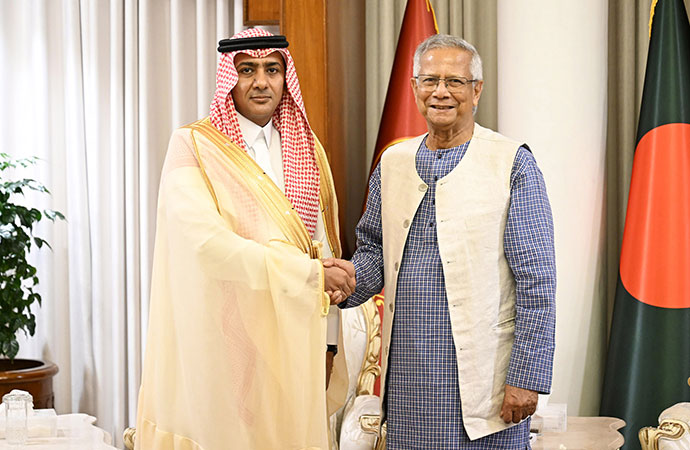Essays

Author speaking about the book and its content.
The Foreign Correspondents' Club of Japan (FCCJ) is the prestigious press club situated at the city center that attracts the attention of media personalities and urban elites of Tokyo for various programs it organizes. The FCCJ has recently held a book event at its premises at the Marunouchi city center focusing on the memoir of Club's lonely member from Bangladesh. The book entitled "A Time to Dream and a Time of Despair" is in fact the second part of Monzurul Huq's memoir focusing on the eventful and most significant episode of the struggle for freedom that the people of Bangladesh has witnessed in the long period of history. Published by Cosmos Books, the book was originally launched in January this year with a launching ceremony arranged by the Cosmos Gallery in Dhaka. The FCCJ event was thus a follow-up of that earlier event and was a part of Club's ongoing monthly arrangement of discussions focusing on books about Japan written in English, as well as books authored by Club members.
Moderated by the veteran American journalist Bradley Martin, the event was attended by journalists from different countries who are stationed in Tokyo and covering Japan for various media outlets. The lively discussion was also accompanied by a colorful display of selected art works that two young rising stars of our artistic world had drawn for the two-part publication. Biswajit Goswami, a professor of the department of art of the University of Dhaka, has made his contribution to turn the first part of the book a work of art as well; while another young promising artist, Sourav Choudhury, was in charge of drawing relevant paintings for each of the fourteen chapters of the second part of the memoir. A selection of those works of arts depicting distinctively motives and moods of Bangladesh rightfully earned the praise and appreciation of the audience.
The Book Break events organized by FCCJ do not usually follow the set pattern of speaking arrangements and hence the head table remains a place for simply two persons - the moderator introducing the author and his or her book and the author speaking for about an hour giving a detailed account of the background of the book along with the topics covered. There is no option for a chief guest, neither there is any for other keynote speakers.
The first part of the memoir entitled "A Story of My Time" was published three years ago and FCCJ also had its due share in publicizing its launching with an earlier event in the summer of 2022. Much has happened and still happening in Bangladesh since then and uncertainty surrounding the political atmosphere is still looming large. Most of our past achievements are now being questioned and becoming selective targets of attacks, as if to proof that deconstruction of history demands a complete departure from the past. The 1971 War of Liberation also has not been spared from the attacks launched by various groups dominating street politics in Dhaka. Hence, the publication of "A Time to Hope and a Time of Despair" has been seen by many as a timely endeavor to carry the message that the Liberation War of Bangladesh is not something that can be easily replaced by any follow-up event centered on much narrower focus. And this too was the message that Monzurul Huq, author of the book, and also others trying to keep the burning flame of collective memory of the people shielded from undue attacks are trying to convey through various events and initiatives. FCCJ Book Event too can be seen as one of such noble gestures.
Moderator Bradley Martin thanked the author and the publisher for launching the book at a crucial phase of country's history and hoped that much of the misunderstanding surrounding the most glorious chapter of the history of Bangladesh is going to be cleared with the passage of time.
Time frame of this second part of author's memoir is very precise indeed, as it starts on March 25, 1971, when the military leadership of Pakistan launched the brutal assaults on the civilian population of East Pakistan, and ends on December 17 of the same year, when the author and his fellow freedom fighters entered Dhaka after a long journey full of agony, anxiety as well as joy and utmost satisfaction. In between all the details of day-to-day involvements of young freedom fighters have honestly been described. The author has written the book in English with the intention of conveying the details of atrocities committed by the political and military leadership of Pakistan as well as sacrifice and devotion of people of Bangladesh in their pursuit of reaching the ultimate goal of freedom and independence to a broader global audience. The FCCJ event was thus, a supporting initiative of foreign journalists based in Tokyo to help carrying that message to the global audience.
A lively question and answer session at the end of author's presentation provided further evidence of a successful initiative that the author described in his initial speech as an attempt to fight forgetfulness with the no less deadly weapon of memory of those who are still alive to give evidence of what was really happening around. And this goal of placing memory to its rightful position will definitely continue as long as the last representative of that generation does not make the final departure.
(All photos are curtsey of FCCJ)

























Leave a Comment
Recent Posts
Religion and Politics: A Toxic ...
At Dhaka University, cafeteria workers have been told not to wear shor ...
Enayetullah Khan joins AsiaNet ...
AsiaNet’s annual board meeting and forum was held in Singapore, ...
In a New York minute
Many leaders back a UN call to address challenges to ..
Defaulted loans at Non-Bank Financial Institutions ( ..
How the late Zubeen Garg embodied cultural affinitie ..